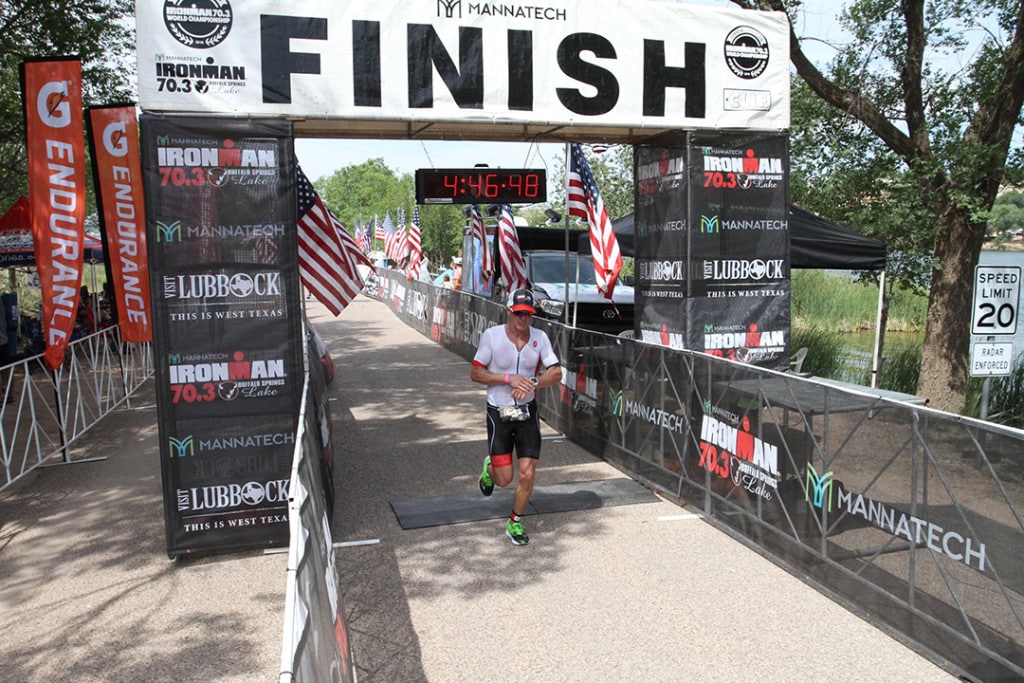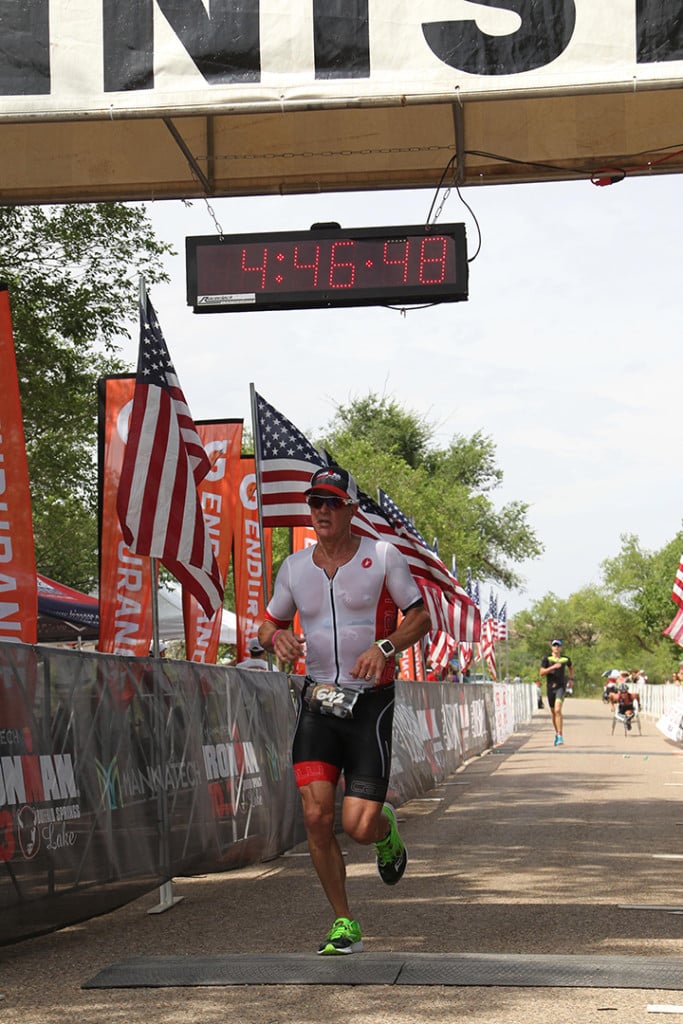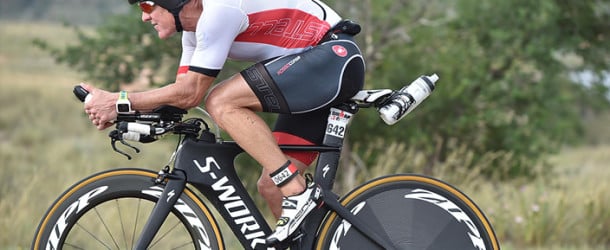Local Triathlete Prepares For 2016 Ironman 70.3 Mile World Championship
By Austin Price
Kevin Cart isn’t the first person I’d think of when I imagined a man who regularly places first in triathlons and will be attending the 2016 Ironman 70.3 World Championship in Australia come September. Most triathletes I’ve known have been tall, lean and intense — something like human greyhounds. They seem bred for the sport.
And why not? At 70 miles, the Half Ironman (so named because it only covers half the distance of a full Ironman) is a grueling battery of races. It seems as if anybody who could swim 1.2 miles, bike another 56 and run the last 13.1 in a matter of hours would need to shed every unimportant pound and maybe every unessential thought.
Not so for Cart; he is quite a bit more muscular.
He is also affable, open, quick to smile and seems as eager to meet me as I am to meet him.
Most interviews I conduct generally take place in an office, over warmed-over coffee — not over lunch at a Chili’s.
Cart doesn’t talk or look at all as if he’s just returned from a 20-hour trip to Lubbock or the Half Ironman that brought him there. Even when he reveals that he came in second and that his time was, at 4 hours and 46 minutes, not quite as impressive as his personal best — 4 hours and 17 minutes, for those curious — there isn’t even a note of disappointment in his voice.
“Every race is different,” he says, brushing the whole thing off. “I try to match my time if I can, but sometimes you can’t. Lubbock’s a lot hillier than the other Half Ironmans I’ve run.” 
As for the other racers, well, he tries not to worry too much about how he compares. “Sure, I keep track of the competition. But I’m mostly focused on my own times.”
Again, that’s not the first sentiment one expects to hear from somebody who, in the 10 years since he’s taken up this hobby of racing triathlons, has qualified to race in the World Championship twice. Only 3,000 athletes out of 130,000 qualify for an invitation to the world championship; only 30 people from Cart’s division, which includes all male competitors between the ages of 45 and 50, make the cut.
To say it’s highly competitive is a bit of an understatement. Yet Cart doesn’t think of it in these terms. “Oh, yeah, we all want to beat each other, but there’s a very friendly atmosphere before and after the race. It’s a real communal sport. A lotta camaraderie.”
It’s nothing, he says, like cycling or running or swimming, all of which he’s found to have very serious — bordering on snobbish — kinds of cultures among the professionals. “A lot of these professionals are a totally different breed,” he notes. “They’re all kinda jerks.”
It’s understandable that he would shy away from those worlds, then, given that he came to racing through other types of people. From the way that he’s quick to start talking about his wife, his kids, his grandchildren and his many training partners; and from the obvious pride he feels in these things; it’s clear that for him, sports is as much a matter of belonging to a community as it is of challenging himself.
“My family doesn’t go anywhere without talking about sports. My parents, my kids, my grandkids: it’s always been a huge part of our lives.”
It was his mother who introduced him to running when he was young and often brought him along on her runs. It was his brother who introduced him to cycling, and it was their mutual friend Randy Biggs who actually brought him — albeit in a roundabout manner — to the world of triathlon races.
“My brother and I used to team up to try and beat Randy. I’d cover the swimming and the running, and he’d get the cycling.” They consistently lost, even with their massive advantage. Only when Cart decided to handle the cycling himself did he discover that he was able to surpass his brother’s times, as well as Biggs’, and that he had not only a talent for the triathlon but also a love for it. 
He’s been at it now for the better part of a decade. Last year, he qualified for the World Championship, then being held in Austria. Circumstances wouldn’t allow him to go; it was too expensive, he said, noting that without a sponsor the financial burden was all on him. But he promised himself that if he qualified again, he would go. And then he qualified, this time at Galveston. Urged on by his wife, he decided he’d have to keep his promise.
What, exactly, this course of competing in the World Championship will entail, he’s not sure of yet. But if he’s not prepared, it won’t be for lack of training.
Some may not understand that a triathlon is grueling; as much a test of mental as physical endurance; a test that begins well before the race.
Weekly training consists of early morning swims every day, with an hour-long bike ride or run every evening. Weekends are taken up with four-hour bike rides, which are often followed by a lengthy run — a routine known as a “brick” to racers.
Cart even squeezes in weight training during his lunch hour, devoting half of it to lifting. Cart says he’s seen enough athletes sidelined by damage to joints to know you can’t simply skimp on strength training.
His triathlon preparation is an all-consuming hobby that demands nearly 20 hours of dedicated training a week. Cart, who used to be an avid golfer, laughs and says he finally had to pick between golf and his family. Dropping out of triathlons was out of the question. “Even my holidays are about racing,” he jokes, explaining that his wife and children have made a point of buying him racing gear for every gift. Last Father’s Day, they bought him a top-of-the-line racing suit he’d been dropping hints about for months.
This isn’t to say that cutting-edge equipment is necessary for competition. Cart does invest a great deal on the sport – he estimates that the bike he uses has run him roughly $15,000 over the years. But the biggest cost is, again, time. “I can have the best of this, the best of that, but if I don’t train, I’m not doing much come race day. What it is is all the hard work you put into it.”
How much longer he plans to stay at it, he can’t say. “I’ve seen guys 79 years old up there at the awards ceremony, looking like they found the fountain of youth. It’s flabbergasting. Personally, I don’t know if I’ll hold up. Everybody knows how hard running can be on your joints, your hips.”
Nor does he plan to make it a career. The rewards for the actual race are paltry — just a few medals or plaques he’s as likely to give to his grandchildren as keep for himself. And Cart has no desire to seek sponsorship; turning his hobby into another job isn’t something he’s much interested in.
The only major thought he’s given to his future as a racer is with regards to beating his personal record and, maybe one day, passing on everything he’s learned as a coach.
That’s not for some time, though. Right now, Cart’s focus is entirely on the Half Ironman Championship in Australia. It wouldn’t do to get distracted when the race hasn’t even started, after all.
















Comments are closed.